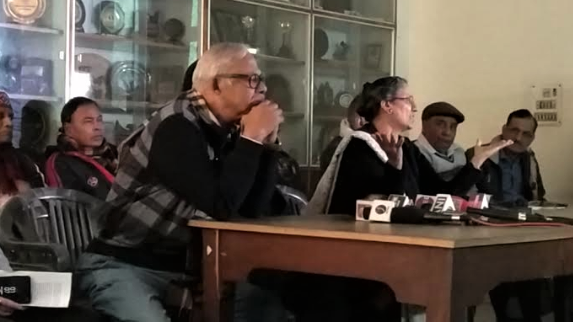#WorkersStrikeBack: Numerous Sectors to Feel the Heat of the Nationwide Strike

Numerous Sectors to Feel the Heat of the Nationwide Strike
Holding to the 12-point demand charter, workers across the country would observe a two-day countrywide strike from the midnight of January 7 against the anti-labour, anti-people and the anti-national policies of the BJP-led NDA government.
As the preparations are in the last lap, unions from various sectors – including banking, insurance, coal and non-coal mines, petroleum, post, telecom, engineering, manufacturing, steel, defence, health, education, water management and projects, power, road transport, central and state government employees and auto-taxi unions – have come in support of the strike. Apart from these, unions and associations of agricultural workers, plantation workers, scheme workers, construction workers, vendors etc. will also be participating in the strike.
The All India Kisan Council has given a call for a rural hartal in solidarity with the general strike. All India Kisan Sabha along with All India Agricultural Workers’ Union will actively campaign on demands by the peasantry and rural poor.
The strike has been announced by Indian National Trade Union Congress (INTUC), All India Trade Union Congress (AITUC), Hind Mazdoor Sabha (HMS), Centre of Indian Trade Unions (CITU), All India United Trade Union Centre (AIUTUC), Trade Union Coordination Committee (TUCC), Self Employed Women’s Association (SEWA), All India Central Council of Trade Unions (AICCTU), Labour Progressive Federation (LPF) and United Trade Union Congress (UTUC) after the national convention of workers that was held in September 2018.
Read More: #WorkersStrikeBack: Why Are Workers Striking for Better Wages?
The two-day strike is being considered as the continuation of the movements that have been led by the working class across the country. On September 2, 2015, and September 2, 2016, general strikes were observed by the workers under a joint platform of the central trade unions. Following that, a three-day Mahapadav was held between November 9 and 11, 2017 with a massive mobilisation of workers across the country. Again, on January 17, 2018, nearly 80 lakh scheme workers had observed a general strike demanding regularisation of jobs, and implementation of the recommendations of the 45th Indian Labour Conference.
While addressing the media, the trade union leaders have pointed out how the BJP-led Centre has been trying to privatise the public sector entities, and how various sectors have consistently been fighting against such policies. The trade unions have clearly pointed out that “the government policy of mass privatisation of strategic PSUs, crucial infrastructure and public utilities, specially targeting the ports, airports, telecom, financial sector etc with defense production and railways thrown open for 100 percent foreign direct investment, is aimed at loot of the national assets and resources on the one hand and destruction of country’s economic base on the other”.
The Centre, which had failed to respond to the demands of the workers, has not held Indian Labour Conference for the last three and half years. It was pointed out by the trade unions: “Desperate attempts are being made to make gross pre-employer changes in labour laws, both piecemeal and also hastening the codification of 44 central laws into four, totally ignoring the viewpoints of the trade unions,”
Read More: #WorkersStrikeBack: How ‘Modern Times’ Are Squeezing Workers in TN’s Auto Hub
“Ever since the strike call has been made, the Modi government has increased its pace of attacks on workers instead of dialogue with the unions,” said Tapan Sen of CITU, while speaking to media. Ahead of the strike, the Delhi government under the order of the governor has evoked Essential Services Maintenance Act (ESMA) against the electricity employees and engineers in NCT, barring them from joining the nationwide workers’ strike. Apart from Delhi, such news is coming from different parts of the country, added Sen.
The state governments, including the West Bengal and Tamil Nadu, have intimidated the workers by threatening with termination of service, service break, eight-day wage cuts etc. CITU has condemned these decisions by the state governments.
Read More: #WorkersStrikeBack: Agri Unions, Unorganised Sector Workers in West Bengal to Join Strike in Big Way
Get the latest reports & analysis with people's perspective on Protests, movements & deep analytical videos, discussions of the current affairs in your Telegram app. Subscribe to NewsClick's Telegram channel & get Real-Time updates on stories, as they get published on our website.
























